Looking to bring a dash of authenticity to your next Jewish Steampunk party? Want to know if you’re being insulted for your heritage if you travel back in time to Victorian England?
You’re in luck! An authentic 1909 slang dictionary is available for free online, and its many delights include words and phrases about and of the Jewish community of London’s East End. These Jews, many of them immigrants from other European countries and their descendants, were largely working class, often operating in trade when intersecting with mainstream society, but also having a world unto themselves. With this combination of insularity and mingling with a racist culture in cursory ways, what could possibly go wrong?
Routledge books published Passing English of the Victorian Era: A Dictionary of Heterodox English Slang and Phrase in 1909 (a few years after the era formally ended). James Redding Ware, the pseudonym of English writer Andrew Forrester, is the author. You can read the whole book online, and it’s quite a work. The dictionary is full of gems you should absolutely incorporate into your vocabulary ASAP: A “mutton shunter” is a police officer, and “batty-fang” is “to thrash thoroughly.” You can use enough of these words to make yourself completely incomprehensible, if you like. Instead of going for a walk to look at the sky, “Do a stamp” to “cast an optic” at the “blue blanket.”
The introduction to the book mentions that it contains several entries for “Anglo-Yiddish,” part of a specifically East London vernacular rich in language “outgrown from the Hebrew stem.” Jews were a growing minority, so they’re well-represented in this work.
In contemporary America, especially cities like New York, words like “schlep” and “chutzpah” have made it to the mainstream, so how did Jews factor into the common language in the epicenter of one of the world’s most powerful empires? Let’s go through a Magical Mystery Tour.
To get it over with, the first category isn’t words borrowed from Jews so much as… slurs. But get excited— you’ve never seen anti-Semitic slurs as nuanced and colorful as this! There are variations for any occasion:




Snide-sparkler (Trade — Jewish Jewellers’). False diamond.

I do wonder why did army veterans in particular tended to use that slur, but other slurs are so bizarre they’re almost delightful:
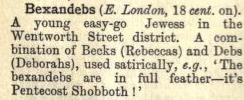
Wow, the more things change, the more they stay the same! I too get in full feather when it’s Pentecost Shobboth! But what about my male counterparts? This only applies to Jewesses, like me!
As someone who bristles at the term “J.A.P,” it’s nice to know that Jewish women have always been shamed for attempting to make themselves look nice as though it were a sign of unearned entitlement.

Ah, thank you. I have no idea what the difference is between a “young Joseph” and “young old David.”
Next, we have words as advertised, lifted out of Yiddish, Hebrew, and Jewish culture. It seems something might have been lost in translation, and at times, transliteration:
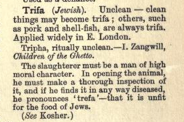
Tripha, ritually unclean.—I. Zangwill, Children of the Ghetto.
The slaughterer must be a man of high moral character. In opening the animal, he must make a thorough inspection of it, and if he finds it in any way diseased, he pronounces ‘trefa’— that it is unfit for the food of Jews.
(See Kosher.)


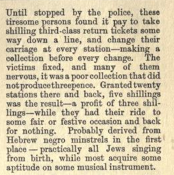
Until stopped by the police these tiresome persons found it pay to take shilling third-class return tickets some way down a line, and change their carriage at every station—making a collection before every change. The victims fixed, and many of them nervous, it was a poor collection that did not produce threepence. Granted twenty stations there and back, five shillings was the result—a profit of three shillings—while they had their ride to some fair or festive occasion and back for nothing. Probably derived from Hebrew negro minstrels in the first place—practically all Jews singing from birth, while most acquire some aptitude on some musical instrument.
…What?
Er… points for sort of including Jews of Color, I suppose. And yes, it’s true. Most Jews can proficiently sing before we can hold our heads up on our own.
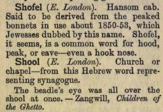
Shool (E. London). Church or chapel—from this Hebrew word representing synagogue.
The beadle’s eye was all over the shool at once.—Zangwill, Children of the Ghetto.
The thought of English Christians calling their church “shool” is somehow hilarious. As for “shofel,” thanks for tying it into hooked noses at the last second there. That was almost a missed opportunity!
This dictionary seems to have used Israel Zangwill’s novel Children of the Ghetto as the ultimate source for Judaism. Zangwill was an authentic source, but it’s also clear that Ware didn’t bother to find a real Jewish person with whom to talk, as becomes increasingly clear:
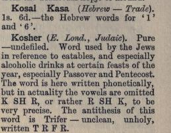
Kosher (E. Lond., Judaic). Pure—undefiled. Word used by Jews in reference to eatables, and especially alcoholic drinks at certain feasts of the year, especially Passover and Pentecost. The word is here written phonetically, but in actuality the vowels are omitted K SH R, or rather R SH K, to be very precise. The antithesis of this word is Trifer—unclean, unholy, written T R F R.
Oh, honey. You tried.
First of all, the words for 1 and 6 in Hebrew, transliterated respectively, are Echad and Shesh.
Next, the explanation for how Hebrew works (backwards with no vowels) doesn’t make sense in the Latin alphabet. Let’s have a secret message writing the same way:
THSLLB S SHT.

So close again! But did you know Jews immigrated to the U.K. from more than two European countries?
Finally, there is actually some slang in the book that seems to be used within the Jewish community (though I somehow doubt it’s comprehensive, or even fully accurate):

![]()

Fun fact- this was the motto of Moses Montefiore. Really.

File that one under “Ideas for Names for Jewish Punk Bands.”

OK, Jews do like olives. You get that one.
![]()

Now the confectioner exchanges his stuffed monkeys, and his bolas… for unleavened palavas, etc.—Zangwill, Children of the Ghetto.
OK, I admit that I was so excited to learn about a Jewish pastry I had never heard of that I tracked down the recipe and made it. But that is a story for another day.
Reading through these can be a bit exhausting if you don’t have a sense of humor. Ultimately, Ware was adorably misguided. He was trying to depict authentic London street language and culture, but was still looking through the lens of good-old-fashioned Victorian racism and imperialism. These are the Jews that Dickens and du Maurier caricatured, where gross stereotype is taken as sociological study.
At least it’s also a peek into a great chapter in Jewish history, and some great ideas for the names of the lineup at a neo-klezmer festival.
To part, here are a few other selections from the dictionary, ranging from the innocuous to the nigh incomprehensible:


‘My high—look at Beck.’
Or, you can spell it with a “K”:


Kate Vaughn was perhaps a trifle too dainty, and I fancy any Kitty so circumstanced, on the sudden return of master in the midst of unlawful revelry, would have taken some pains to cover up the resplendent and unaccustomed ‘klobber’—I believe that is the aristocratic term, Kate ought to know, now,—donned for the occasion.—Ref. 17th May 1885.
And belted knight
Isn’t such a sight
As Becky Moss in her klobr.’
‘So I klobbered myself up as well as circs would permit.’

Link and froom (Street, Hebrew). ‘Dolly’, who was a Jewess, but one who was link rather than froom, was about forty years old at the time of her death.—Ref., 3rd February 1889.

It’s been real. BEXANDEB OUT!








Hello. remarkable job. I did not expect this. This is a splendid story. Thanks!
Mutual Mistake Found in Formation of Settlement Agreement lasix Julius SbdATbUBXlHBrlPNFZ 6 27 2022
You revealed it effectively.
personal essays for college applications [url=https://topswritingservices.com]https://topswritingservices.com/[/url] best custom writing website
Many thanks, Ample tips!
how to write a good expository essay the essay writer best resume writing services washington dc
Thanks. A lot of content!
personal essays for college applications [url=https://ouressays.com]how to write a essay introduction[/url] university essay writing service
You said it nicely..
good essay writing service [url=https://essayssolution.com]issues to write about in a college essay[/url] best writing services
Whoa lots of wonderful advice.
essay writing website academic essay writing help online writing service
You said it perfectly.!
essay writer reddit [url=https://quality-essays.com]writing essays online[/url] write my thesis
Incredible a lot of excellent information.
how to write a persuasive essay for kids essay writings rewriting service
Awesome content. Thanks a lot.
bad college application essays [url=https://altertraff.com]good college essays[/url] best assignment writing service
You’ve made your point.
music for writing essays essay writing service best dissertation writing service
Many thanks, A lot of knowledge!
help writing essays for scholarships [url=https://topswritingservices.com]essays writing service[/url] customer writing
Seriously quite a lot of awesome tips!
interesting college essays [url=https://flowleadsua.com]https://flowleadsua.com/[/url] cite website in essay
Amazing lots of useful facts.
when writing an essay how to write a personal biography essay write my homework
Useful posts. Thanks!
essay writer helper [url=https://service-essay.com]write my essay[/url] coursework writer
Incredible a lot of superb data!
prime essay writing [url=https://dissertationwritingtops.com]https://dissertationwritingtops.com/[/url] ghostwriter service
You actually expressed that really well!
buy cheap essay online analysis essay writing pay someone to write my assignment
Beneficial advice. Thanks a lot!
custom essay cheap [url=https://theessayswriters.com]write my college essay me[/url] custom essay writing service
Really quite a lot of superb tips.
do my essay for cheap essays help web copywriting services
Truly tons of terrific material.
writing an essay conclusion [url=https://agbsl.pro]essay writings[/url] need a ghostwriter
Many thanks, I value it!
george orwell essay on writing [url=https://freshappshere.com]https://freshappshere.com/[/url] literature review writing service
You definitely made the point.
the help essay prompts write my essays pay for writing
Many thanks! An abundance of content.
writing an analysis essay [url=https://ouressays.com]https://ouressays.com/[/url] help writing thesis statement
Very well spoken truly! !
who can help me write an essay https://altertraff.com/ business writing services
Regards. Numerous stuff!
importance of college education essay [url=https://topswritingservices.com]writing my essay[/url] executive resume writing services nyc
Excellent data. Cheers.
essay on help [url=https://essayssolution.com]how to write reflective essays[/url] doctoral dissertation writing help
Cheers. I like it!
essay writing [url=https://freshappshere.com]how to write a summary of an essay[/url] australian essay writing service
Nicely put. Thanks a lot.
how to write a good analytical essay https://englishessayhelp.com/ writers wanted online
You stated this well.
writing the essay [url=https://altertraff.com]https://altertraff.com/[/url] academic writing services company
You said it nicely.!
how to write a why college essay [url=https://agbsl.pro]what to write my college essay on[/url] writing websites
Fine forum posts. Thank you!
college essay help online help with scholarship essays write my assignment ireland
Wonderful data. Thanks!
what to write my college essay on [url=https://freshappshere.com]https://freshappshere.com/[/url] academic writing services
With thanks, I enjoy this!
how to write a compare essay [url=https://essayssolution.com]argumentative essay topics[/url] professional custom writing service
You stated it really well!
help with essay custom essays cheap college essay writing service reviews
Kudos. Plenty of content!
website that writes essay for you [url=https://essaywriting4you.com]how to write an argumentative essay[/url] online letter writing service
You’ve made your position extremely well.!
stephen king essay on writing [url=https://orangepornhub.com]writers resources from paragraph to essay[/url] citing website in essay
Very well spoken without a doubt! !
who to write an essay how to write a successful college essay i need help writing my personal statement
Try SkinCeuticals Epidermal Repair 74, which combines beta- glucan to exfoliate and unclog pores and a combo of botanical extracts to kill bacteria and deeply hydrate. buy doxycycline
You reported that superbly.
how to write persuasive essay [url=https://englishessayhelp.com]https://englishessayhelp.com/[/url] help me write a thesis
Regards! I value it!
admission essay writing services https://flowleadsua.com/ cv writing services
Thanks, Good information.
buy cheap essays online [url=https://essaywriting4you.com]custom writing essay[/url] custom writing service reviews
Lakkaako kainalokarvojen kasvu tietyssä pituudessa
You made your point pretty effectively!.
admission essay writing how to write a cause effect essay dissertations writing service
Superb information. Appreciate it.
college acceptance essays [url=https://altertraff.com]writing my essay[/url] custom writings
Really plenty of good knowledge!
should college athletes be paid persuasive essay [url=https://topswritingservices.com]college essays[/url] online resume writing services
Nicely put, Appreciate it.
should everyone go to college essay writing my essay help with report writing
Cheers, A good amount of info.
essay writing classes [url=https://essayssolution.com]essays writer[/url] essay help websites
Terrific material. Thanks a lot!
hire essay writer [url=https://homeworkcourseworkhelps.com]college essay[/url] essay writing website
You explained this wonderfully.
columbia college essay essay writing service help with thesis writing
You actually expressed it very well!
how to write an informative essay [url=https://writingthesistops.com]write my admission essay[/url] wanted freelance writers
Wonderful facts. Appreciate it!
top essay editing service [url=https://theessayswriters.com]argumentative essay topics[/url] write my thesis
Wonderful tips. Regards.
writing prompts for essays custom written essay online custom writing services
Cheers. Great information!
colleges essays [url=https://service-essay.com]https://service-essay.com/[/url] essay writing services reviews
You actually revealed that wonderfully.
creative college essay essay writer best website for essays
Superb write ups, With thanks!
custom essay cheap [url=https://theessayswriters.com]services essay[/url] resume writing services online
Fine posts. Thank you!
what to write in a college essay [url=https://service-essay.com]https://service-essay.com/[/url] doctoral dissertation writing service
Thanks a lot! Great information.
college essay checklist how to write an argumentative essay academic ghostwriter
Many thanks! Plenty of advice.
freedom writers analysis essay [url=https://agbsl.pro]essays writing service[/url] professional writer services
Really loads of good facts!
how to write a really good essay [url=https://freshappshere.com]https://freshappshere.com/[/url] christian ghostwriting services
cheap online nolvadex
Nicely put, Cheers!
custom essay station write my essay professional writing services rates
With thanks! A good amount of write ups.
how to write classification essay [url=https://theessayswriters.com]https://theessayswriters.com/[/url] technical writer
Nicely put, Cheers.
buy custom essays online [url=https://essaypromaster.com]https://essaypromaster.com/[/url] writing essay services
You revealed it terrifically!
college essay starters writing college level essays professional essay writing services
Many thanks! Terrific stuff!
writing a grad school essay https://essayssolution.com/ photo essay website
Nicely put, Thank you.
what to include in college essay [url=https://topswritingservices.com]how to write a essay[/url] affordable essay writing service
Cheers! Excellent information.
reflective essay help [url=https://essayssolution.com]learn to write essays[/url] cheap essay writing service us
Thanks. Fantastic stuff!
how to write a citation in an essay essay rewriter research proposal writing service
Superb data, Cheers!
college essay review services [url=https://topswritingservices.com]custom essay paper writing[/url] cheap dissertation writing services
Amazing lots of very good knowledge.
expository essay help [url=https://ouressays.com]https://ouressays.com/[/url] writing website
This is nicely said! !
how to write an evaluative essay essays to get into college website analysis essay
Appreciate it, Plenty of content!
writing a character analysis essay [url=https://essaywriting4you.com]how to write a rogerian essay[/url] help me write a thesis
Terrific content, Appreciate it.
best writing essay [url=https://theessayswriters.com]college essay[/url] creative writing help
Point certainly applied.!
someone to write my essay essay typer content writing services usa
You actually expressed that perfectly.
how to write a college application essay [url=https://service-essay.com]how to write a successful college essay[/url] review writing service
Really a lot of great data!
essay writing ppt [url=https://quality-essays.com]https://quality-essays.com/[/url] help with academic writing
Regards! Lots of postings!
college essay hook law school essay writing essay writing service toronto
Cheers! Fantastic information!
help in essay writing [url=https://service-essay.com]https://service-essay.com/[/url] can you write my assignment
clomiphene citrate 50 mg men Drug Metab Dispos.
You’ve made your point.
how to write an explanatory essay [url=https://freshapps.space]essays writing services[/url] articles writing service
Helpful tips. Regards.
narrative college essay argumentative essay topics websites that write essays for you
You stated it exceptionally well. how to write a good argumentative essay [url=https://essaypromaster.com/#]argumentative essay topics[/url] writing dissertations
You actually expressed it perfectly. [url=https://theessayswriters.com/#]writing my essay[/url] i need help with my college essay
Effectively voiced indeed! . https://definitionessays.com/ professional custom writing services
Thanks! A good amount of posts.
high school vs college essay compare and contrast college essays professional essay writing services